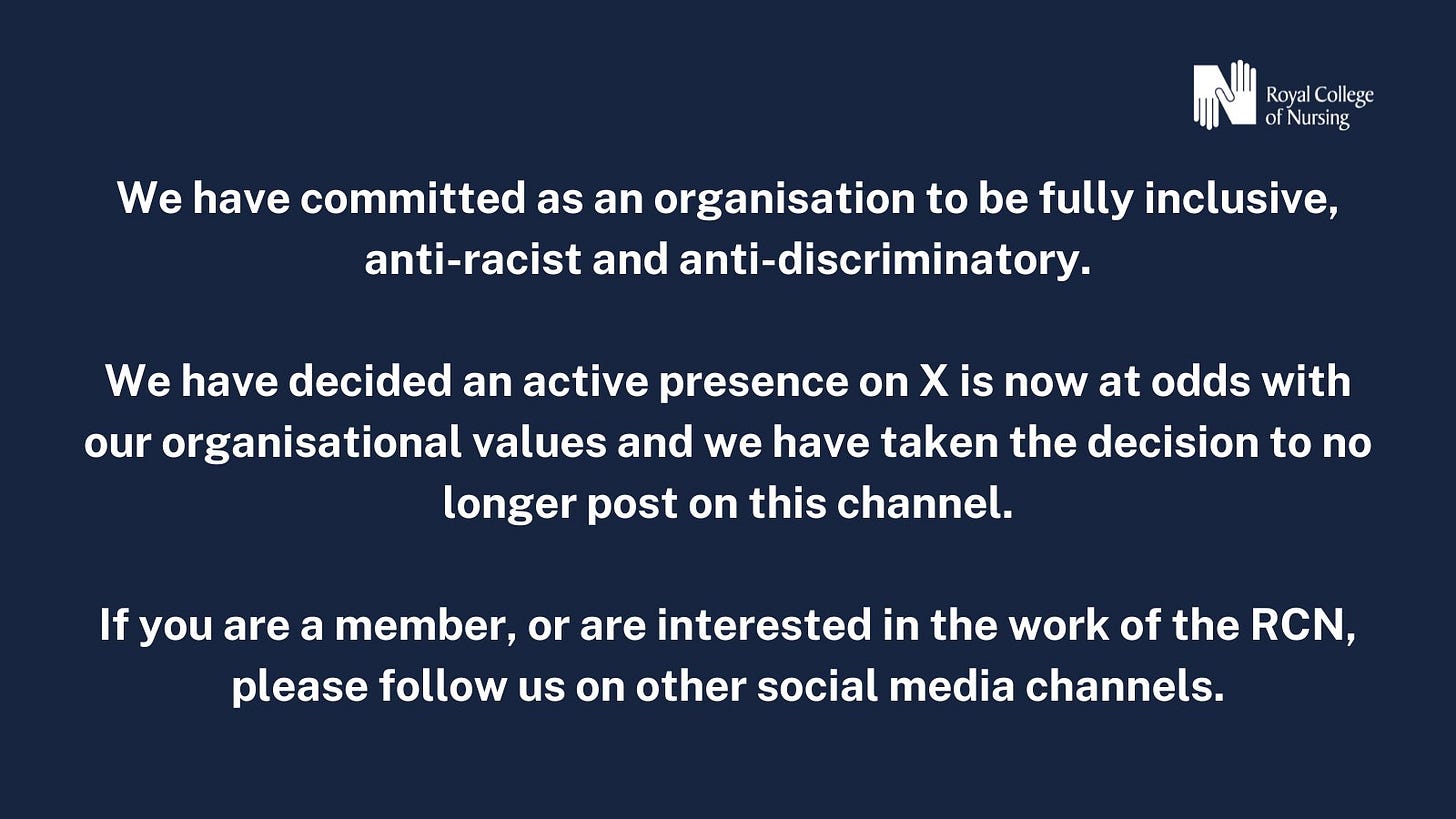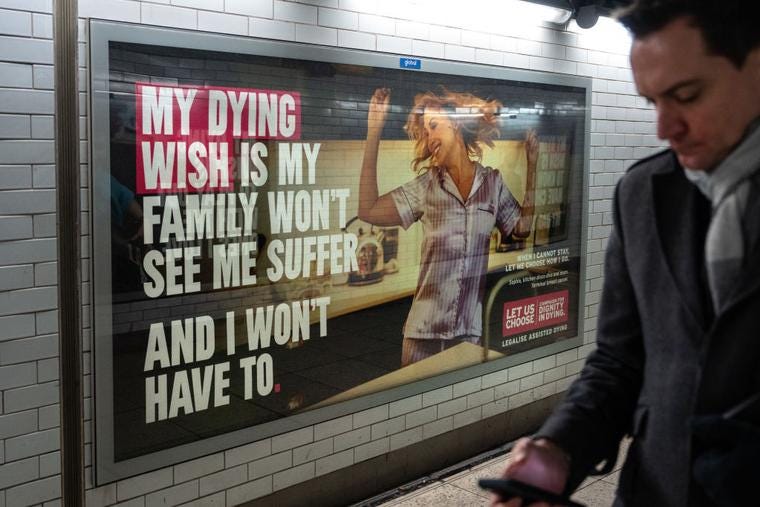The Weekly Weird #49
Billionaire eats banana, blasphemy in the UK, a scammy AI granny, X-odus, Australia kicks kids off social media, Britain votes for assisted dying, Suk in South Korea
Welcome back to your Weekly Weird, in which one wanders wonderingly through the sweet shop of society, marvelling at all the bitter pills. A spoonful of sarcasm helps the dystopia go down!
Up-fronts:
Justin Sun, the billionaire cryptocurrency entrepreneur, bought the world’s most expensive banana, a piece of art by Maurizio Cattelan titled ‘Comedian’, at a Sotheby’s auction in New York for $6.2 million…and then ate it on camera in Hong Kong to rapturous applause and breathless commentary about “this creative and symbolic moment.” David Galperin of Sotheby’s New York, admirably maintaining a straight face, slightly undermined the story in an interview with the Wall Street Journal: “What you buy when you buy Cattelan’s ‘Comedian’ is not the banana itself, but a certificate of authenticity that grants the owner the permission and authority to reproduce this banana and duct tape on their wall as an original artwork.” Sounds like the physical version of an NFT. How fitting that a crypto-bro spaffed millions on it, got publicity for eating it, and all of it is nonsense anyway because he can eat the banana as many times as he likes, seeing as he bought the concept and not the bendy yellow fruit itself. Well, the important thing is that he liked it.
British Member of Parliament Tahir Ali, the Labour representative for Birmingham Hall Green & Moseley, asked Prime Minister Keir Starmer during Prime Minister’s Questions whether he would “introduce measures to prohibit desecration of religious texts and targeted vilification of all the prophets of the Abrahamic faiths.” Ali phrased his question in the context of Islamophobia Awareness Month, taking place in the UK right now, and mentioned only the Koran as an example of the texts he was describing, so it came over as a call for the re-introduction of blasphemy laws in Britain specifically because of sensitivity from the Muslim community, or at least Tahir Ali MP. The British public responded on X:
One reply pointed out a telling oversight in Ali’s attempt at demanding a legal framework for cultural sensitivity from others:
My personal favourite was this pithy meme:
CNN reported that “a conversational artificial intelligence chatbot [was] created by British mobile phone company O2 to help combat fraud by tricking phone scammers into thinking they are speaking to a real person.” The “AI granny”, named ‘Daisy’, exists “to talk with fraudsters and waste as much of their time as possible with human-like rambling chat to keep them away from real people.” Not only are AI deepfakes a growing threat to trust and security, now a phone company is deepfaking the deepfakers in another step towards the oft-mooted future in which most interactions are machines talking to machines because humans have been crowded out…
The Human Washing Machine of the Future (Mirai Ningen Sentakuki), first unveiled in the Japanese city of Osaka at a tech expo in 1970, will be back on display in 2025. The updated version is worth describing at length, as per the Daily Mail:
Once a user climbs into the clear plastic pod, the capsule fills halfway up with warm water.
They are then blasted by highspeed water jets containing extremely small air bubbles less than three micrometres in diameter.
When these bubbles burst, they produce a small but powerful pressure wave which dislodges dirt from the skin.
This is the same process used in industry to clean electrical components that can't be washed with chemicals.
However, Science Co. says that its human washing machine doesn't just clean the body but can also 'wash the mind' using artificial intelligence.
As the user receives their wash, electrodes implanted in the chair gather their biological information to ensure the bather is washed at an appropriate temperature.
At the same time, an AI interprets this information to work out if they are calm or excited and projects a specifically selected video onto the inside of the plastic pod to soothe their nerves.
The result, according to Science Co., should be a speedy wash which leaves the bather feeling physically and mentally refreshed.
You don’t need to understand Japanese to appreciate the video:
Let’s proceed!
X-odus
Hot on the heels of the Guardian taking their digital ball and going home, i.e. abandoning the social media site X because of their definitely-not-at-all-hollow-and-hypocritical reservations about the site’s owner, über-fecund Dogecoin trillionaire Elon Musk, several other pretenders to the Throne Of Righteousness have likewise made it known that they will no longer be associated with X.
The UK’s Royal College of Nursing bailed this week, citing their “organisational values” which include being “fully inclusive,” a value that apparently doesn’t include the people (of which some are their members) who use X.
RWTH Aachen, a German technical university in Rhein-Westphalia presumably run by smart people who themselves went to university, likewise pulled the plug on their X presence in favour of platforms that they seem to believe don’t flood the feeds of their users with algorithmic content aimed at increasing engagement by generating anxiety, stress, anger, and discontent, like TikTok.
The European Federation of Journalists are getting off at the next stop as well, with a plan to freeze their X account from 20 January 2025.
“We cannot continue to participate in feeding the social network of a man who proclaims the death of the media and therefore of journalists,” said EFJ President Maja Sever. “The social media site X has become the preferred vector for conspiracy theories, racism, far-right ideas and misogynistic rhetoric. X is a platform that no longer serves the public interest at all, but the particular ideological and financial interests of its owner and his political allies.”
Of course, their position is unassailable because X is the only platform that serves “the particular ideological and financial interests of its owner and his political allies.” That doesn’t happen anywhere else in online or European media. Nope, not even a little bit.
Celebrities like Luke Skywalker, that guy who was in Scream1, and the chanteuse/actress/Brolin-botherer Barbra Streisand have decamped for greener pastures at BlueSky, an alternative social media site that was sent into “moderation hell” by censorship requests from new users not long after becoming the platform of choice for people who no longer wanted to be on X.
Why exactly are the great and the good so concerned by what Wired eloquently called “a kind of Dadaist refusal to take an unserious world seriously,” despite its possible consequences of “ceaseless ironizing that foments cynical complacency”?
Some of that landed hard here at the Weird, but while we’ll cop to cynicism and Dadaism, we definitely vote against complacency.
Moving swiftly on!
Australia Kicks Kids Off Social Media
In a world-first, Australia has voted to ban under-16s from social media.
The law will make platforms including TikTok, Facebook, Snapchat, Reddit, X and Instagram liable for fines of up to 50 million Australian dollars ($33 million) for systemic failures to prevent children younger than 16 from holding accounts.
Australian Prime Minister Anthony Albanese said of the new law: “Platforms now have a social responsibility to ensure the safety of our kids is a priority for them.”
If you’ve read the Weird before, you probably know what’s coming next.
Platforms have one year to figure out how to enforce the ban before the penalties kick in.
Digital Industry Group Inc., an advocate for the platforms in Australia, said questions remain about the law’s impact on children, its technical foundations and scope.
“The social media ban legislation has been released and passed within a week and, as a result, no one can confidently explain how it will work in practice – the community and platforms are in the dark about what exactly is required of them,” DIGI managing director Sunita Bose said.
The Guardian hit the streets of Rome, Paris, and London to get public reactions to the law’s passage. The video is interesting to watch, in particular because of how many young people support the ban, and because the word “parents” is never mentioned.
Who are all these independently wealthy tweens that can afford smartphones, computers, and internet connections without any input from their parents?
The pathway to the ban’s enforcement must surely at least pass by if not directly through the Forest of Age Verification and the Bog of Digital ID, both of which sit in the shadow of the Panopticon, according to the map used by your humble correspondent.
Does that mean that social media is doubleplus-good for the kids? Of course not.
But it also might not be as clear-cut as everyone says, according to a 2023 meta-analysis from Stetson University (yes, that is also the name of a cowboy hat).
Widespread claims suggest potentially harmful effects of social media use on youth. This was investigated in a meta-analysis of 46 studies of youth social media use and mental health. Results indicated that the current pool of research is unable to support claims of harmful effects for social media use on youth internalizing disorders. Some types of methodological weaknesses, such as evident demand characteristics and lack of preregistration, remain common in this area. It is recommended that caution is issued when attributing mental health harm to social media use as the current evidence cannot support this.
Did the Australian government, in the past year, get better data than those researchers? Or is this another Lovejoy Law opening the door for increased monitoring and surveillance?
Place your bets…
Britain Votes For Assisted Dying
The UK Parliament, after a five-hour debate which you can watch in full here, voted 330-275 in favour of a law that would permit the state to help people die.
From The Independent:
Under the terms of the bill, a terminally ill adult with a life expectancy of six months or less could seek assistance to end their life, provided that two doctors and a High Court judge approve their decision.
The campaign group Disability Rights UK put out a statement on “this concerning news.”
This decision comes as a profound betrayal to Disabled people across the UK, who continue to struggle to live with dignity in a society that fails to meet even our most basic needs.
At a time when social care is chronically underfunded, accessible housing is scarce, and many Disabled people are unable to afford food, energy, or other essentials, this legislation sends a chilling message: the government prioritises the right to die over the right to live.
We stand firmly against a law that risks pressuring Disabled people into decisions driven by fear, desperation, or lack of options rather than genuine choice. This legislation could deepen inequalities and reinforce societal biases that view Disabled people’s lives as less valuable.
One example of why an assisted dying law that is well-intended in principle can still be a cause for concern to disabled people in practice is the (mis)treatment of Canadian military veteran and Paralympics competitor Christine Gauthier. Gauthier, who requires a wheelchair, spent five years fighting to get an access ramp installed at her home and was sent a pretty shocking offer in lieu.
"I have a letter saying that if you're so desperate, madam, we can offer you MAID, medical assistance in dying," said Gauthier who first injured her back in a training accident in 1989.
“Hey lady, if you need a wheelchair ramp so bad, why not just kill yourself?” is hardly the type of reasoned sensitivity the public was assured would be built into these types of laws.
Canada’s MAID law was due to be expanded in March 2024 to include “people suffering solely from a mental illness who meet all the eligibility criteria and safeguards,” but the government announced in February that the expansion would be delayed until at least 2027. The reason?
However, in its consultations with the provinces, territories, medical professionals, people with lived experience and other stakeholders, the Government of Canada has heard – and agrees – that the health system is not yet ready for this expansion.
AMAD, Canada’s Special Joint Committee on MAID, “recommended that [the expansion] not be made available in Canada until the health care system can safely and adequately provide MAID for these cases.”
“This extension,” the government said, “would provide more time for provinces and territories to prepare their health care systems, including the development of policies, standards, guidance and additional resources to assess and provide MAID in situations where a person's sole underlying medical condition is a mental illness.”
Rarely does a slippery slope argument write itself from the debate stage into reality so readily. First, the state will help kill people with terminal illnesses who are suffering terribly. Eventually, the state will also help kill people who just want to die because they are mentally unwell.
Besides the parameters of who is covered by the right to die, there’s the ugly, age-old question of money. It isn’t entirely unreasonable, especially in countries with national health services like Canada or the UK, to be concerned about a possible culture shift from keeping people alive at any cost to keeping people alive up to a certain cost.
There’s more, of course, and that’s without bringing in questions of morality and philosophy that I won’t subject you to here.
Instead, here’s a poster pushing the pro-assisted dying side of the argument.
You know what makes ladies dance in the kitchen? Legal access to the sweet release of the hereafter.
Chalk one up to the late, great Bill Hicks - how far out are we from his preferred method?
Suk In South Korea
South Korea’s President Yoon Suk Yeol “ordered martial law without warning in a speech late Tuesday where he vowed to eliminate “anti-state” forces he said were plotting rebellion and accused the main opposition parties of supporting the country’s rival, North Korea,” according to Associated Press.
South Korea’s constitution permits the president to declare martial law, but gives the power to rescind it to the parliament, who swiftly voted 190-0 to do just that, despite the best efforts of the troops deployed to prevent legislators from accessing the building.
During the tense hours under martial law, heavily armed forces surrounded the parliament, backed by army helicopters and armored vehicles. Lawmakers climbed walls to get into the building and held off troops by activating fire extinguishers. Politician and former news anchor Ahn Gwi-ryeong tried to pull an assault rifle away from a soldier who had pointed it at her chest as she shouted: “Aren’t you ashamed of yourselves?”
The parliamentarians who managed to re-enter the building voted unanimously, 190-0, to rescind Yoon’s martial law. Now, the South Korean parliament is bringing impeachment proceedings against him.
Reuters had these quotes in their coverage:
“Even if martial law is lifted, he cannot avoid treason charges. It was clearly revealed to the entire nation that President Yoon could no longer run the country normally. He should step down," senior DP member of parliament Park Chan-dae said in a statement.
"South Korea as a nation dodged a bullet, but President Yoon may have shot himself in the foot," said Danny Russel, vice president of the Asia Society Policy Institute think tank in the United States.
The BBC had more, on the hollowness of Yoon’s reasoning:
Despite the wording of Yoon's pronouncement, it quickly became clear within South Korea that his drastic move was in response to a series of political events that have destabilised his leadership.
A South Korean woman, who wished to remain anonymous for fear of speaking out, said she felt Yoon was “attempting to restrict everyone's freedom and right to express their concerns and judgement towards the government".
Yoon, according to a Reuters report in September, had an approval rating of 20%, a record low. In retrospect, that seems high…
That’s it for this week’s Weird, everyone. I hope you enjoyed it.
Outro music is the Banana Split theme song from the 1960s children’s show, dedicated to Justin Sun’s Marie Antoinette-esque banana-munching, and all the other bananas out there.
Four bananas make a bunch
and so do many more
Stay sane, friends.
And, for fellow cinephiles, the excellent college comedy Dead Man’s Curve.















I think it’s hilarious how people/groups think they are going to hurt Musk by leaving X 😂
“…Or is this another Lovejoy Law opening the door for increased monitoring and surveillance?” By every hook and crook!!
Thanks for this week’s installment 😊